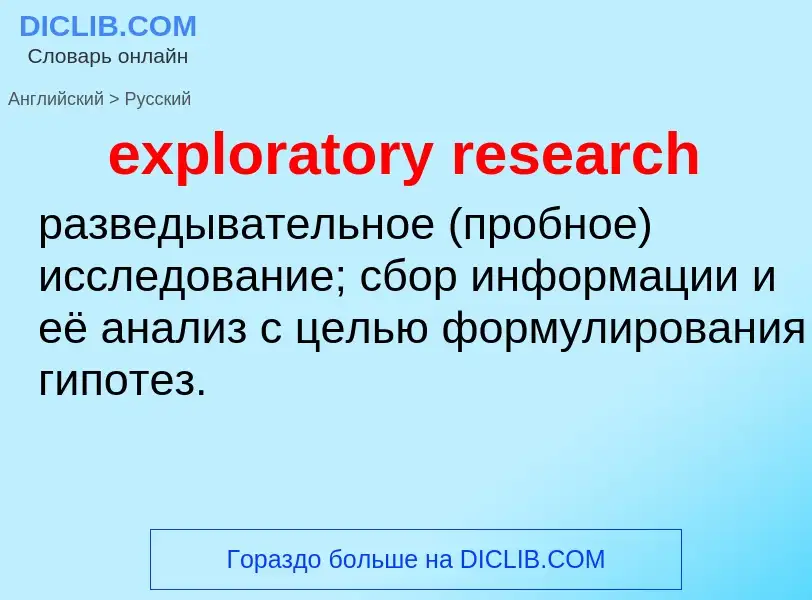Μετάφραση και ανάλυση λέξεων από την τεχνητή νοημοσύνη ChatGPT
Σε αυτήν τη σελίδα μπορείτε να λάβετε μια λεπτομερή ανάλυση μιας λέξης ή μιας φράσης, η οποία δημιουργήθηκε χρησιμοποιώντας το ChatGPT, την καλύτερη τεχνολογία τεχνητής νοημοσύνης μέχρι σήμερα:
- πώς χρησιμοποιείται η λέξη
- συχνότητα χρήσης
- χρησιμοποιείται πιο συχνά στον προφορικό ή γραπτό λόγο
- επιλογές μετάφρασης λέξεων
- παραδείγματα χρήσης (πολλές φράσεις με μετάφραση)
- ετυμολογία
exploratory research - translation to ρωσικά
[ik'splɔ:rət(ə)ri]
общая лексика
исследовательский
зондирующий
медицина
пробный
нефтегазовая промышленность
разведочный (о скважине)
прилагательное
общая лексика
исследовательский
разведочный
пробный
испытательный
исследующий
Ορισμός
Βικιπαίδεια
Exploratory research is "the preliminary research to clarify the exact nature of the problem to be solved." It is used to ensure additional research is taken into consideration during an experiment as well as determining research priorities, collecting data and honing in on certain subjects which may be difficult to take note of without exploratory research. It can include techniques, such as:
- secondary research - such as reviewing available literature and/or data
- informal qualitative approaches, such as discussions with consumers, employees, management or competitors
- formal qualitative research through in-depth interviews, focus groups, projective methods, case studies or pilot studies
According to Stebbins (2001) "Social Science exploration is a broad-ranging, purposive, systematic prearranged undertaking designed to maximize the discovery of generalizations leading to description and understanding". His influential book argues that exploratory research should not use confirmatory mechanisms like hypotheses. It should be qualitative and rely on inductive research methods like grounded theory introduced by Glaser and Strauss Qualitative exploratory research which use inductive approach do not use priori theorizing or build on previous research. Casula, Rangarajan and Shields (2020) argue that exploratory research should not be limited to inductive approaches. They propose the working hypothesis is a useful framework for deductive exploratory research that should be part of the social scientist's tool bag.
Exploratory research can add quality and insightful information to a study, and is vital to a study. research allows for the researcher to be creative in order to gain the most insight on a subject. Next, an outside audience will be used for this research, so it is a good opportunity for the researcher to know what works or what is not a productive method to use. Third, it allows for a better understanding on what a research team's objectives should be throughout the duration of a project. Having this information in mind will be beneficial to anyone conducting research from outside sources.
Regardless of what field research needs to be done in, exploratory research can be used in a multitude of fields. However, as a result of this it is important to acknowledge how the different fields will impact any research that will be conducted. Comparing and contrasting different techniques, such as secondary research, discussions, or qualitative research through focus groups, surveys or case studies will be useful to observe. Within exploratory research, the Internet allows for research methods that are more interactive in nature. For example:
- RSS feeds efficiently supply researchers with up-to-date information
- services such as Google Alerts may send major search-engine search results by email to researchers
- services such as Google Trends track comprehensive search results over lengthy periods of time
- researchers may set up websites to attract worldwide feedback on any subject
When research aims to gain familiarity with a phenomenon or to acquire new insight into it in order to formulate a more precise problem or to develop a hypothesis, exploratory studies (also known as formulative research) come in handy. If the theory happens to be too general or too specific, a hypothesis cannot be formulated. Therefore, a need for an exploratory research may be realized and instituted to gain experience that may help in formulating a relevant hypothesis for more definite investigation.
The results of exploratory research are not usually useful for decision-making by themselves, but they can provide significant insight into a given situation. Although the results of qualitative research can give some indication as to the "why", "how" and "when" something occurs, they cannot reveal "how often" or "how many".
Exploratory research is not typically generalizable to the population at large.
Social exploratory research "seeks to find out how people get along in the setting under question, what meanings they give to their actions, and what issues concern them. The goal is to learn 'what is going on here?' and to investigate social phenomena without explicit expectations." This methodology is also at times referred to as a grounded theory approach to qualitative research or interpretive research, and is an attempt to unearth a theory from the data itself rather than from a predisposed hypothesis.
Earl Babbie identifies three purposes of social-science research: exploratory, descriptive and explanatory.
- Exploratory research takes place when problems are in a preliminary stage. Exploratory research is used when the topic or issue is new and when data is difficult to collect. Exploratory research is flexible and can address research questions of all types (what, why, how). Exploratory research is often used to generate formal hypotheses. Shields and Tajalli link exploratory research with the conceptual framework working hypothesis. Skeptics, however, have questioned the usefulness and necessity of exploratory research in situations where prior analysis could be conducted instead.

